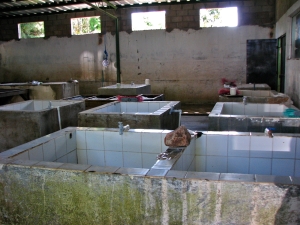The United Nations has declared that next year, 2012, will be the International Year of Cooperatives; since 1992, the first Saturday in July has been the International Day of Cooperatives. Worldwide, cooperatives directly employ over 100 million people, according to the UN. A cooperative is a business owned by a group of individuals, and the members are owners who share equally in control of their business and most likely meet at regular intervals to discuss the operations. Typically a cooperative will elect a director or small group of directors to oversee day-to-day affairs and hire people as needed. The idea of a cooperative is that those with similar needs join together for mutual gain, which often is helpful in gaining greater market access, purchasing necessary equipment or supplies, or obtaining services at a lower overall cost. A typical agricultural cooperative will unite agricultural producers to gain a wider market share, to collaborate on various processing and transportation needs, and to obtain supplies at a reduced cost.
Voluntary private cooperatives have recently been a boon to Mexican farmers; there are approximately 15,000 farming cooperatives in Mexico whose memberships numbers surpass 5 million. For the cooperatives in Mexico, the greatest benefit has been bulk marketing. The cooperatives have warehouses and other storage facilities that allow their farmers to immediately deliver their products to the cooperative, and then the cooperative can deliver the larger quantities to the buyers. NGOs have cited cooperatives as the primary reason behind positive community development in regions where new cooperatives have joined together. An increase in community development has meant more jobs are created, education is prioritized, health is improved, and local economy is strengthened. Another benefit from the cooperatives in Mexico is that the farmers can share expensive equipment that improves their efficiency, but alone they would not have been able to afford. Around 85% of the world's 460 million farms are less than 2 hectares, and the majority of these farmers earn less than 2 dollars a day. Access to infrastructure, knowledge of improved farming techniques, processing capacity, and even basic health care are all often out of reach of these farmers. Couple that with rising food prices and distorted market prices as a result of agricultural dumping, and it's clear that these farmers are at a distinct disadvantage.
Joining together in a cooperative will improve the livelihoods of these same farmers, but starting a cooperative is challenging due to the start-up costs. There are few resources and start-up capital available in Latin America for farming cooperatives. Governmental, non-governmental and private investors have all had a part in investing in the 15,000 cooperatives in Mexico, and once a cooperative gets off the ground, the results can be tremendous. According to the Inter-Press Service News Agency (IPS), cooperatives in Mexico have assets totaling 8.3 billion dollars - which demonstrates the economic importance of their existence. Several agricultural cooperatives exist in El Salvador as well, such as Los Planes Organic Cooperative, and Biolact - a yogurt producer, and several coffee cooperatives. Investing in agricultural production is an investment in food security and regional stability. In developing (and even developed!) countries, allowing small farmers avenues to thrive and compete against giant agribusiness corporations will improve the status of the most impoverished and therefore improve the overall health and wealth of the nation.


